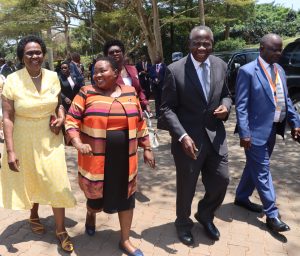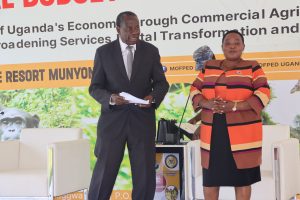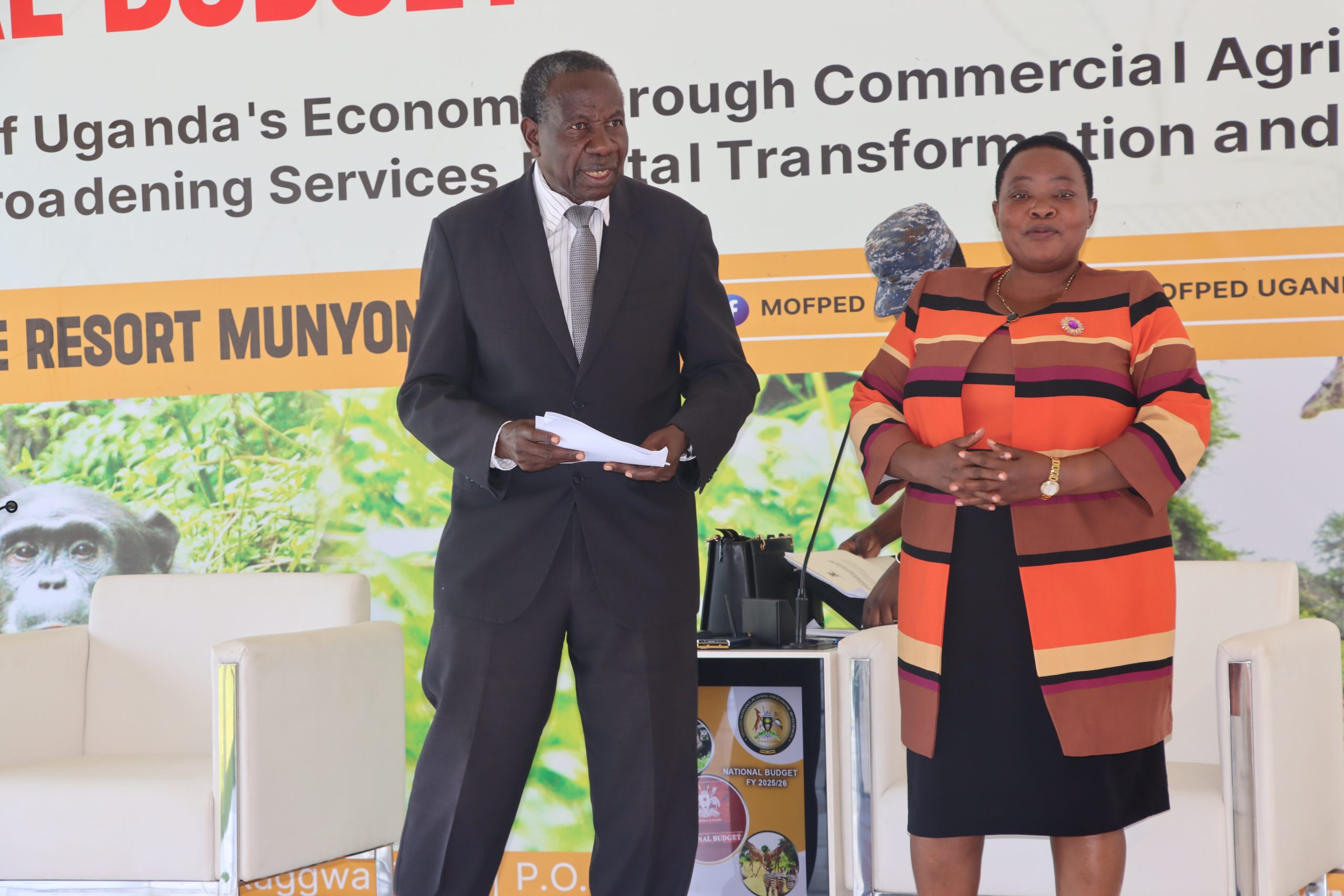By: Ismael Kasooha
MUNYONYO
As the country enters the planning and budgeting period for the coming financial year 2025/2026, the National Resistance Movement (NRM) government is committed to increase the size of the economy ten-fold by the year 2040.
“Ladies and Gentlemen, starting FY 2025/2026 and over the medium term, the NRM Government is committed to building and expanding the size of our economy from the current GDP of US$ 50 billion to US$ 500 billion by the year 2040 anchored on the tenfold growth strategy. This calls for involvement of all actors in the growth and development agenda of this country,” said Robinah Nabbanja, the Prime Minister of Uganda.

The Prime Minister Rt. Hon. Nabbanja Robinah with the Finance Minister Matia Kasaija and the State Minister for Environment Beatrice Anwyar share a light moment at the Budget conference at Speke Resort and Conference Center
Nabbanja had represented H.E the president Yoweri Kaguta Museveni during the National Budget Conference held at Speke Resort and Conference Center Munyonyo on Wednesday.
“Following guidance from H.E. the President, the theme for next year’s budget is: Full Monetization of Uganda’s Economy through Commercial Agriculture, Industrialization, Expanding and Broadening Social Services, Digital Transformation and Market Access,” noted Nabbanja.
She said that the above theme is consistent with the vision of the NRM Government of increasing household incomes and improving peoples’ standards of living to achieve socio-economic transformation of Uganda.
“You recall, at this time last year we convened at the Kololo Ceremonial Grounds to discuss the budget priorities for this FY 2024/2025. We agreed on seven key growth areas as follows:
Peace and security (of life and property) for all the people of Uganda; Roads and bridges maintenance, rehabilitation of the Meter Gauge Railway and construction of the Standard Gauge Railway and water transport.
Others were Electricity, with focus on enhancing transmission; Wealth creation initiatives like PDM, Emyooga, Agricultural Credit Facility (ACF), Microfinance Support Center, Science, Technology and Innovation including ICT (the Knowledge Economy), Investing in the people of Uganda through Human Capital Development, including: Health, Education, Provision of clean water for human consumption and for production; creative industry and social protection; and Management of natural disasters, and regional and international commitments,” she said.
Nabbanja said that based on the strategic policy direction by H.E. The President and in order to realize the above target in the National Development Plan (NDP) IV strategy and the NRM Manifesto 2021-2026, the following areas will guide the overall planning and budgeting process for next financial year and over the medium term.
She noted that Full monetization of Uganda’s economy through wealth creation, driven by the Parish Development Model, Emyooga, Generating Growth Opportunities for Women (GROW), Investment for Industrial Transformation and Employment (INVITE), capitalization of Uganda Development Bank and other such related grants.
The Premier said that the GROW and INVITE projects are to allow the Government to extend affordable credit to small and medium enterprises.

The Prime Minister Rt. Hon. Nabbanja Robinah (right) and the Minister for Finance Hon. Matia Kasaija during the Budget Conference at Speke Resort and Conference Center Munyonyo
She said that Agro-Industrialization and light manufacturing; Tourism development; Mineral-based Industrial Development including Oil and Gas; and Science, Technology and Innovation (STI) including Creative Industry and ICT will also spur development.
Nabbanja told the conference that Uganda’s economy had fully recovered from both external and domestic shocks that previously hampered growth over the past three financial years and is now on the right growth trajectory.
“As Government, we are shifting the economic growth rate to a higher trajectory of an average real economic growth rate of about 8% per annum. And with the onset of commercial production of oil & gas, this growth will go to double digit,” she said.
Nabbanja thanked the NRM leadership for guaranteeing the following five key policy areas through the current NRM Manifesto 2021 – 2026; Creating Wealth and Jobs, Delivering Education and Health, Ensuring Justice and Equity, Protecting Life and Property and Achieving Economic and Political Integration.
She said that the FY 2025/2026 will be the last year of implementation of the current Manifesto and therefore, as Government, we shall be giving back accountability to the people of Uganda as we head towards the 2026 polls.
“As we go into the detailed planning and budgeting for FY 2025/26, I call upon all Ministers and Accounting Officers of Government, to ensure full implementation of the Government priorities aligned to the seven strategic priorities earlier mentioned and the five key growth areas which will facilitate achievement of double-digit growth,” Nabbanja said.
She cautioned that line Ministers as supervisors and Accounting Officers are going to be held accountable to deliver on these areas.
The Minister for Finance, Planning and Economic Development, Matia Kasaija said that in line with the Public Finance Management Act 2015, as amended, he will issue the first Budget Call Circular to give detailed guidance to all Programmes, Ministries, Departments and Agencies to start preparation of the Financial year 2025/2026 budget framework paper in line with this the strategy.
Kasaija said that his Ministry will embark on completion of the NDP IV and detailed programme implementation action plans that will detail the actions required to implement the development strategy.
He said that the national budget framework paper shall be presented to Parliament by 31st December 2024.
Civil Society Organisations appealed to the government to establish the Civil Society Fund that is independent, to help them execute their mandate of holding the government to account on behalf of the people in check as provided for in chapter IV of the bill of rights in the constitution of Uganda.
The local Development Partners lauded the government of Uganda for its openness and transparency in the process of formulation and implementation of the budget and pledged for continued support to Uganda.
Uganda is leading the entire region in budget implementation, transparency and involvement of the other stakeholders.
End





